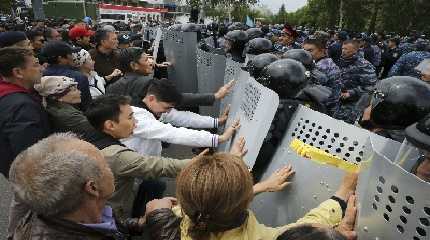
MOSCOW (AP) — Dozens of protesters and 12 police died during extraordinarily violent demonstrations in Kazakhstan that saw government buildings stormed and set ablaze, authorities said Thursday. One police officer was found beheaded in escalating unrest that poses a growing challenge to authoritarian rule in the Central Asian nation.
After breaking into the presidential residence and the mayor’s office in the country’s largest city Wednesday, demonstrators continued to try to storm more buildings overnight. “Dozens of attackers were liquidated,” police spokeswoman Saltanat Azirbek told state news channel Khabar-24, using a term common to describe the killing of people thought to be extremists. Twelve police officers were killed in the unrest and 353 injured, according to city officials cited by the channel.
While the president initially seemed to try to mollify the protesters, he later promised harsh measures to quell the unrest, which he blamed on “terrorist bands,” and called on a Russia-led military alliance for help. The airports in Almaty and two other cities have been shut, and internet service was severely interrupted for the second day on Thursday, blocking access to Kazakh news sites.
Tens of thousands of people, some reportedly carrying clubs and shields, have taken to the streets in recent days in the worst protests the country has seen since gaining independence from the Soviet Union three decades ago. Although the demonstrations began over a near-doubling of prices for a type of vehicle fuel, their size and rapid spread suggest they reflect wider discontent in the country that has been under the rule of the same party since independence.
A Russia-led military alliance, the Collective Security Treaty Organization, said early Thursday that it would send peacekeeper troops to Kazakhstan at Tokayev’s request.
The operation is the first military action by the CSTO — an indication that Kazakhstan’s neighbors, particularly Russia, are concerned that the unrest could spread.
Russia and Kazakhstan share close relations and a 7600-kilometer (4700-mile) border, much of it along open steppes. Russia’s manned space-launch facility, the Baikonur Cosmodrome, is in Kazakhstan.
The size and duties of the peacekeeping force have not been specified. Russia has already begun sending forces, according to the CSTO, which also includes Kazakhstan, Armenia, Belarus, Kyrgyzstan and Tajikistan. But Kyrgyzstan’s presidential spokesman, Erbol Sutanbaev, said his country’s contingent must be approved by parliament and said that the troops would not take actions involving demonstrators.
Tokayev has imposed a two-week state of emergency for the whole country, including an overnight curfew and a ban on religious services. That is a blow to Kazakhstan’s sizable Orthodox Christian population who observe Christmas on Friday.
Of the five Central Asian republics that gained independence following the dissolution of the Soviet Union, Kazakhstan is by far the largest and the wealthiest, spanning a territory the size of Western Europe and sitting atop colossal reserves of oil, natural gas, uranium and precious metals. In addition to its long border with Russia, it also shares one with China, and its oil and mineral wealth make it strategically and economically important.
But despite Kazakhstan’s natural riches and a solid middle class, financial hardship is widespread, and discontent over poor living conditions is strong in some parts of the country. Many Kazakhs also chafe at the dominance of the ruling party, which holds more than 80% of the seats in parliament.
The protests appear to have no identifiable leader or demands. Much of the anger displayed in recent days was directed not at Tokayev, but at Nursultan Nazarbayev, the country’s first president who continued to wield enormous influence after his 2019 resignation. Protesters shouted “Shal ket!” (“Old man go”), an apparent reference to Nazarbayev, who dominated Kazakhstan’s politics and whose rule was marked by a moderate cult of personality.
After the demonstrations spread to Nur-Sultan and Almaty, the government announced its resignation, but Tokayev said the ministers would stay in their roles until a new Cabinet is formed, making it uncertain whether the resignations will have significant impact.
At the start of the year, prices for the fuel called liquefied petroleum gas roughly doubled as the government moved away from price controls as part of efforts to move to a market economy.




